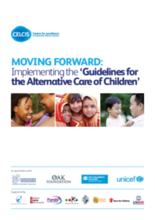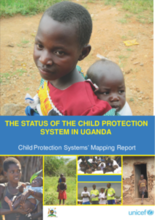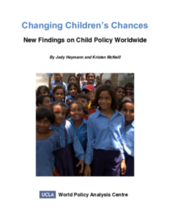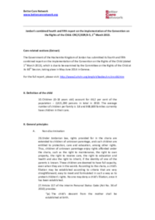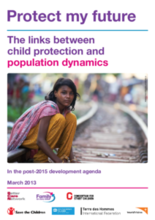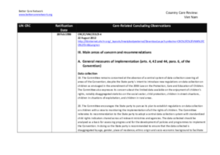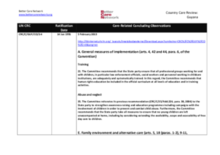Displaying 1261 - 1270 of 1798
This handbook, Moving Forward: Implementation of the ‘Guidelines for the Alternative Care of Children,’ is aimed at legislators, policy-makers and decision-makers, as well as professionals and care providers, to support the implementation of the Guidelines for the Alternative Care of Children, endorsed by the United Nations General Assembly in 2009. It explains the key thrusts of the Guidelines, outlines the kind of policy responses required, and describes ‘promising’ examples of efforts already made to apply them in diverse communities, countries, regions and cultures.
This mapping process was commissioned by the Ministry of Gender, Labour and Social Development in order to facilitate the transitioning of Uganda’s approach to child protection from a disjointed, issue-based and project-oriented approach to a more system-oriented approach in order to respond effectively to the multi-dimensional and complex child protection needs of all children in the country.
This new report by the World Policy Analysis brings together key findings from the book, Children’s Chances: How Countries Can Move From Surviving and Thriving, providing a global picture of what laws, policies, and programs countries have in place to address areas vital to children’s healthy development.
The Government of the Hashemite Kingdom of Jordan has submitted its fourth and fifth combined report on the implementation of the Convention on the Rights of the Child (dated 1st March 2013).
This paper is part of an inter-agency series on the links between child protection and major development goals. The report focuses on the links between child protection and population dynamics as they relate to the post-2015 Millennium Development Goals agenda.
This country care review includes the Concluding Observations for the Committee on the Rights of the Child adopted as part of its examination of Vietnam’s combined third and fourth periodic reports at the 60th Session of the Committee held between 9 May and 15 June 2012. The Committee’s recommendations on the issue of Family Environment and Alternative Care as well as other care relevant issues are highlighted.
To consider the appropriateness of baby hatches, this article presents and examines the validity of each major objection to establishing baby hatches.
Using data from three rounds of the Young Lives longitudinal survey conducted in 2002, 2006, and 2009 in Ethiopia, this paper investigates whether the death of a parent during middle childhood has different effects on a child’s schooling and psychosocial outcomes when compared with death during adolescence.
This Recommendation by the European Commission on Investing in Children, stresses the importance of early intervention and preventative approaches, and makes quality childcare one of its key policy areas to break the cycle of disadvantage in early years and reduce the risk of child poverty and social exclusion.
This country care review includes the care related Concluding Observations adopted by the Committee on the Rights of the Child as part of its examination during the sixty-second session (14 January- 1 February 2013) of Guyana’s combined second, third and fourth period reports to the Convention on the Rights of the Child, as well as other care-related concluding observations, ratification dates, and links to the Universal Periodic Review and Hague Intercountry Adoption Country Profile.

